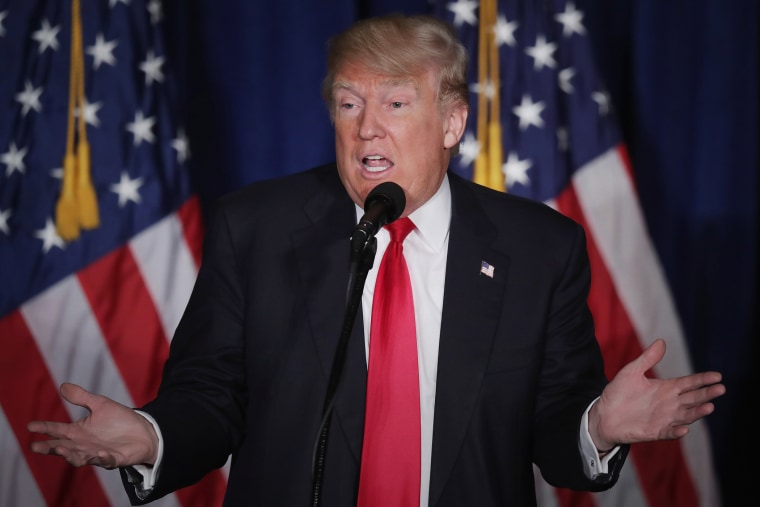Every presidential candidate is going to boast about all of the many reasons he or she deserves voters' support. It's how the process works: White House hopefuls, without exception, are going to present themselves as the best possible person for one of the world's most important jobs.
And with that in mind, Donald Trump, perhaps more than most, seems to take great pride in singing his own praises, celebrating his wealth, judgment, and professed wisdom in ways that have evidently won over much of the Republican Party's base. Some of these boasts have even impressed a handful of political pundits.
Last week, for example, Patrick Smith, Salon's foreign affairs columnist, argued that Trump's views on foreign policy deserve to be taken seriously because the Republican frontrunner opposed the war in Iraq -- unlike a certain Democratic candidate.
The New York Times' Maureen Dowd devoted much of latest column, published yesterday, to a related point.
The prime example of commander-in-chief judgment Trump offers is the fact that, like [President Obama], he thought the invasion of Iraq was a stupid idea. [...] You can actually envision a foreign policy debate between Trump and [Hillary Clinton] that sounds oddly like the one Obama and Clinton had in 2008, with Trump playing Obama, preening about his good judgment on Iraq....
It's easy to imagine Trump and his campaign team celebrating pieces like these. It's equally easy to expect a series of related arguments in the coming months from Clinton detractors looking for an excuse to support the GOP's nativist demagogue.
There is, however, a rather important problem with the entire argument: it's based on a fairly obvious lie.
Trump's claim is that he, relying solely on his extraordinary instincts and unrivaled prognostication skills, recognized that the war in Iraq would be a disaster from the outset. The political establishment at the time lacked Trump's vision, but if insiders had only listened to him, a catastrophic mistake could have been avoided.
Last fall, Trump went so far as to say, in multiple interviews, that he was so outspoken in his condemnations of the U.S. invasion plans in 2003 that officials from the Bush/Cheney White House actually reached out to him, urging him to tone down his criticism before he started turning Americans against the coming conflict.
These are all important assertions in the 2016 race, which may impress Clinton's critics, but which aren't even remotely true. Not to put too fine a point on this, but Trump is brazenly, shamelessly lying. There is literally no evidence to substantiate any of his claims, and extensive evidence that proves the opposite.
On Sept. 11, 2002, for example, Howard Stern asked Trump, "Are you for invading Iraq?" Trump replied, "Yeah, I guess so."
One can certainly characterize this as lukewarm support for the disastrous war, but it's hardly a position that can fairly be described as opposition. And for a New York Times columnist to tell readers that Trump "thought the invasion of Iraq was a stupid idea" is both wrong and bizarre. (As of this morning, Dowd's error has not yet generated a correction.)
In fairness, Trump eventually criticized the war in Iraq, but only well after the Bush/Cheney policy took a devastating turn for the worse and it became painfully obvious to everyone that the U.S. invasion had been a terrible mistake. But by the time Trump acknowledged this, he was only repeating observations that had already dawned on much of the country.
The larger dynamic to keep in mind is that some in the political world have not yet come to terms with Trump's unique style of campaigning: (1) manufacture self-aggrandizing boast; (2) repeat said boast regularly; (3) wait for unsuspecting media professionals to accept boast at face value; (4) repeat.
It's a shame some haven't noticed the pattern sooner, failing to recognize the importance of scrutinizing Trump's demonstrably ridiculous claims, but it's not too late. The likely Republican nominee will continue to make outrageous boasts with no basis in fact, counting on journalists to simply give him the benefit of the doubt, between now and Election Day. For those who've been fooled by Trump's falsehoods, now would be an excellent time to re-adjust their b.s. detectors accordingly.
